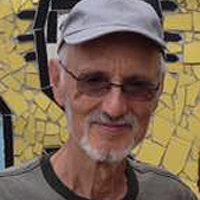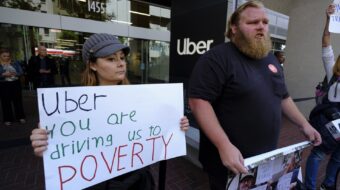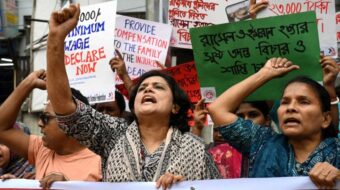The National Taxi Workers Alliance made history Oct. 20, when it officially became a full member of the nation’s largest labor federation, the AFL-CIO.
Bhairavi Desai, the taxi workers’ leader, accepted the organization’s charter as a member of the AFL-CIO at an event in Washington titled “The Future of Work.” The gathering, sponsored by the AFL-CIO, focused on the rights of workers who are either traditionally excluded from coverage by labor law, or for whom the changing economy has effectively eliminated any protection they may have had., under the law.
After she accepted the charter from the AFL-CIO, Desai participated in a panel discussion that included representatives of workers in these categories.
With Desai on the panel were Ai-jen Poo, director of the National Domestic Workers Alliance; Justin Molito, director of organizing for the Writers Guilds of America, East; and Bill Cruice, founding executive director of the Pennsylvania Association of Staff Nurses and Allied Professionals, NNU. Also on the panel was economist David Weil, a Boston University professor who specializes in how changing business models affect employee rights.
As Desai accepted the charter she was cheered by dozens of exuberant taxi workers in the crowd, wearing T-shirts that said “Justice, Rights, Respect, Dignity.”
Richard Trumka, president of the AFL-CIO, called the taxi drivers “an inspiring example of how working people are organizing even in the face of employment relations that have eroded all of our rights.”
Companies that own fleets of taxicabs often claim the drivers are independent contractors, “owners,” “associates,” or any one of a variety of other titles, all in an attempt to avoid honoring their rights as workers.
The everyday life of a New York cabbie, however, gives the lie to the idea that they are not exploited workers. Drivers often must work six days a week and 12 hours a day just to eke out a subsistence living for themselves and their families.
The National Taxi Workers Alliance actually has its origins in New York where the rights of taxi drivers were wiped out during the years of the Reagan presidency.
Desai explained that in New York, under the new system, drivers no longer received a standard commission based on a split with the taxi owners of the day’s fares, and drivers were forced to pay the cost of fuel.
Trumka said that what happened to taxi drivers in New York was part of the nationwide push by companies to do anything they could to free themselves from any obligations to their workers. They especially wanted, he said, to rid their companies of unions and collective bargaining.
During the panel discussion Poo talked about how her group organized in parks and playgrounds where they collected the stories of caregivers for children and for the elderly. She said domestic workers would otherwise have, because of the nature of their work, remained isolated and alone.
Molito, whose union represents, among others, TV writers, spoke about how the explosion of non-fiction television, popularly known as reality TV shows, has been used as a vehicle for the exploitation of writers and other creative talent. Because they’re not writing teleplays, they’re not covered by the agreements that other TV workers enjoy. “They’re working 12-14-16 hour days,” Molito said, “with no benefits. The non-fiction television workers look to the taxi workers alliance for inspiration.”
Secretary of Labor Hilda Solis, who also attended, applauded the taxi workers for setting an example for workers in other sectors.
Solis said that to protect the unrepresented, her department is investigating employers who misclassify workers. She said the aim is to ensure that workers are properly classified when their work amounts to full-time employment, and that employers pay the appropriate taxes for those employees.

MOST POPULAR TODAY


Zionist organizations leading campaign to stop ceasefire resolutions in D.C. area

Communist Karol Cariola elected president of Chile’s legislature

Afghanistan’s socialist years: The promising future killed off by U.S. imperialism

High Court essentially bans demonstrations, freedom of assembly in Deep South






Comments